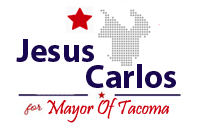Central to Jesus’s platform is a commitment to equity and social justice. Tacoma is a diverse city of ~225,000 people, with a rich tapestry of racial, ethnic, and cultural communities – approximately 11.9% Hispanic or Latino, 10.7% Black, 8.8% Asian, 1.7% Native American, and more. Yet disparities persist in income, housing, education, and health. A progressive agenda must close these gaps so that zip code, race, gender, or background do not limit one’s opportunities. Jesus will ensure that every policy in this platform is implemented with an equity lens, and introduce specific initiatives to uplift marginalized communities:
- Inclusive Governance: Make City Hall more accessible and responsive to all residents. Jesus will promote policy impacts and ensure diverse voices are included in decision-making. We will hold regular town halls in every part of Tacoma – from North End to South End, East Side to West End – including multilingual forums (with interpreters for Spanish, Vietnamese, Russian, and other common languages in Tacoma). The city will improve language access for all services and communications so that non-English-speaking residents can engage fully. Jesus also supports participatory budgeting: setting aside a portion of the city budget each year for the community to directly decide how it’s spent in their neighborhoods. Empowering residents in budgeting gives voice to those who often feel unheard. Success will be reflected in higher civic participation rates, diverse representation on city boards/commissions, and positive feedback from community surveys about City Hall’s transparency.
- Racial Justice & Policing Reform: Equity in public safety will remain a focus. Jesus will ensure full implementation of Initiative 940 requirements on police de-escalation training, mental health training, and an independent police auditor or inspector general to review serious incidents. Following through on reforms (like body cameras and the recently updated use-of-force policies) will help address racial disparities in policing outcomes. We’ll also invest in programs like Restorative Justice for youth offenders, offering alternatives to the criminal justice system that can break cycles of incarceration (disproportionately affecting youth of color). Tacoma has made progress – for instance, equipping all patrol officers with body cams was a community-driven reform – and Jesus will keep building on that. We will monitor metrics such as racial breakdowns of police stops/arrests and aim to eliminate disparities through training and oversight.
- Closing the Education Gap: While the Tacoma mayor doesn’t run the schools, Jesus will be a strong partner to Tacoma Public Schools to advance equity in education. This means supporting initiatives like the Graduate Tacoma movement to improve graduation rates and working with the school district on after-school programs, internships, and safe routes to schools. We will coordinate City programs with youth services – for example, expanding library and community center programming in neighborhoods where kids are most at risk, and supporting early learning (the city can help secure funding for preschool programs or advocate for state support). An educated community is a more equitable one, and Jesus will use the mayor’s platform to champion educational opportunities for all, including immigrants and refugees (e.g., support for English-language learner programs and GED/job training for those who didn’t finish high school).
- Health Equity and Social Services: As a Human Services Commissioner, Jesus has seen the gaps in our social safety net firsthand. Tacoma will work to ensure that everyone has access to essential services. We will strengthen partnerships with Pierce County Public Health to address disparities in healthcare access, supporting clinics in underserved areas and mental health services citywide. Jesus will advocate for increased funding of behavioral health facilities (so those struggling with addiction or mental illness aren’t cycling through jails and ERs). In addition, we will support food security programs (like food banks and community gardens) in our “food desert” neighborhoods and expand senior services for our aging population. COVID-19 exposed many inequities in health; as we recover, we must invest in community health workers and preventative care outreach, focusing on BIPOC and low-income populations who have worse health outcomes. We can track progress by monitoring indicators like life expectancy by neighborhood and reducing the gaps therein.
- Celebrating Diversity & Community: Tacoma’s diversity is a strength to be celebrated. Jesus will ensure the city supports cultural events, festivals, and art that reflect our communities, from Juneteenth celebrations to Asia Pacific Cultural Center events to Latinx festivals. We will increase small grants for community-led projects that foster cross-cultural understanding and combat hate or bias. Jesus also commits to protecting the rights and safety of all residents, including LGBTQ+ individuals. Tacoma will remain a welcoming city that stands against discrimination in any form. The administration will enforce our anti-discrimination ordinances in housing, employment, and public accommodations, and work closely with the state Human Rights Commission to address complaints. By fostering a culture of inclusion and zero tolerance for hate crimes, we strengthen the social fabric of Tacoma. A metric of success will be increased feelings of belonging and safety reported by marginalized groups in city surveys and maintaining Tacoma’s status as a welcoming city for immigrants and refugees (over 13% of Tacoma’s residents are foreign-born, enriching our city’s culture and economy).
Outcome Metrics: Equity is cross-cutting, so it is successful in all other areas – reduced disparities in income, crime, education, and health. Jesus will establish an Equity Dashboard that tracks indicators such as: minority homeownership rates, income gaps between communities, representation in city employment, etc. The goal is measurable movement toward parity. By the end of Jesus’ term, Tacoma should see narrower gaps (for example, fewer percentage-point differences in unemployment or graduation rates between White and minority residents). Most importantly, success means that all Tacoma residents feel heard and valued in the direction of their city.

